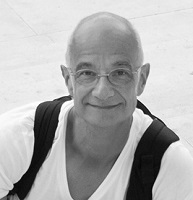Dr, Fabrice Gourbilleau - CIMAP Lab
Abstract
Increasing solar cell efficiency while keeping low cost process is a key issue for the Si solar industry in the next years. One of the solutions consists in reducing the thermalization effect due to the mismatch between the solar spectrum and the energy band gap of the solar cell. To achieve such a goal, conversion frequency layers have been developed with the aim of converting one UV photon into two IR ones. The layers fabricated contain either the couple Pr:Yb or Tb:Yb which allows to absorb energetic photons in the 250-450 nm range and to emit IR photons at 980 nm. The major drawback of using rare earth ions is their low absorption cross section. This issue can be overcome by the development of a host matrix compatible with the Si-PV fabrication and containing sensitizers that efficiently excite the rare earth ions.
Si-based doped layers have been fabricated by means of sputtering technique. After a careful optimization of the SiNx to manage both a wide absorption range and an efficient sensitizing role towards the Tb3+ (Pr3+) ions, the deposition conditions have been optimized to achieve the highest emission intensity when introducing the couple Tb:Yb in the nitride matrix. By a careful analysis of the optical properties of this system, the excitation mechanisms of Tb3+ and Yb3+ ions will be discussed. An internal quantum efficiency higher than 183% has been achieved. To improve the efficiency, a multilayer approach has been developed. It consists in depositing successively a Tb- and a Yb-doped sublayer. The thickness as well as the nature (nitride, oxynitride or oxide) of each sublayer have been determined to optimize the absorption range and the emission intensity at 980nm. First results on solar cell experiments will be described.
3 parvis Louis Néel - 38000 Grenoble
Accès : TRAM B arrêt Cité internationale



